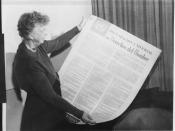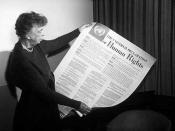Universal human rights are defined in the Universal Declaration of Human Rights (UDHR) and various other instruments such as the International Bill of Rights and The Vienna convention. In the widely acclaimed UDHR the charter clearly speaks of "the equal and inalienable rights of all members of the human family". Article 1 begins "all human beings are born free and equal in dignity and rights" and the liberties set forth in the declaration, "without distinction of any kind" such as race, sex, colour, sex, language, religion, national or social origin, property, birth or other status." The term "human rights" suggests that the rights if humans can take place at anywhere at anytime. The International Human Rights Covenant are just as forthright in claiming that "these rights derive from the inherent dignity of the human person," which is universal.
The term universal human rights generally refers to what John Locke and his followers meant by natural rights.
By definition a natural right is one which is possessed by virtue of being a human being. Natural rights theory attributes human rights solely on the basis of ones humanity: that is in human nature. Since natural rights are grounded in human nature, there are no conditions other than that it is assumed to be possessed universally, equally by all as long as one is a human being. Human rights are regarded as egalitarian because they are held equally by all individuals. They are universal because they apply to every person regardless of race, gender, political background or any other quality.
Natural rights theorists contend that people simply by being people are to be treated in certain ways. These claims are expressed in the form of human rights, which seek to protect or realize human attributes or potentials. Jack Donnelly states that human rights...


